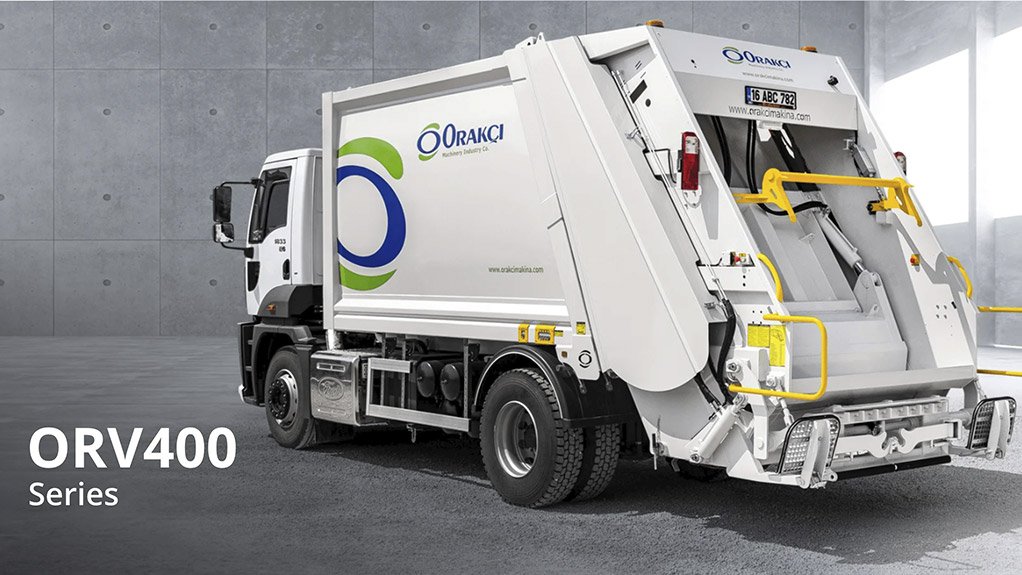Technology-based solutions, refuse compactors and recycling programmes key to driving efficiency in the highly specialised world of waste management
This article has been supplied as a media statement and is not written by Creamer Media. It may be available only for a limited time on this website.
According to the latest available statistics, South Africans generate about 122 million tonnes of waste per year, of which only 10% is recycled or recovered for other uses. At least 90% is landfilled or dumped illegally. Now more than ever, we need good waste management solutions. So, how are we getting there?
Smarter and more tech-focused solutions for the collection and transportation of solid waste are already contributing to efficient refuse management, with reduced costs being a critical factor. Digital technologies in the solid waste sector now contain elements of robotics, artificial intelligence, internet of things, cloud computing, data analysis and communication technology.
Sonia Pretorius, National Sales Manager for 600SA, a division of CFAO Equipment SA that assembles and sells refuse compactors says technology-based solutions make a significant difference in streamlining waste management operations in several ways.
“Smart waste technologies embrace efficiency and lower expenses. Technology allows for the accurate collection, monitoring, and analysis of data related to waste generation, collection, and disposal. This data can help waste management operators identify trends, patterns, and inefficiencies, enabling them to make more informed decisions and optimise their operations accordingly.”
“Tracking and monitoring systems such as GPS can be used to track waste collection vehicles, containers, and bins in real-time. This enables operators to monitor the status and location of these assets, optimise routes, and ensure timely pickups. It also helps prevent unauthorised dumping and theft.”
“Automation technologies, such as robotic arms and conveyor belt systems, can be employed in waste sorting and recycling facilities to increase efficiency and throughput. This reduces the reliance on manual labour, reduces errors and speeds up the overall process,” says Pretorius.
Technology-based solutions can also facilitate the identification, separation, and recycling of specific waste streams. Advanced sorting technologies, such as optical sensors and AI-powered algorithms, can efficiently segregate varied materials for recycling, promoting a circular economy and reducing landfill usage.
Compactors also play a key role as they reduce the waste volume that is collected, making waste transport easier.
For example, the Orakci refuse compactor, distributed locally by 600SA, integrates technologies for a cost-effective way of segregating and recycling waste. Manufactured and assembled locally at the 600SA plant in Johannesburg to meet South African chassis standards and road conditions, it is the robust, yet uncomplicated design of the Orakci that makes it so attractive to businesses working in the refuse management space.
“Being locally manufactured, parts are readily available to reduce downtime, with access to national service centres to ensure compactors are processing refuse, not producing wasted revenue of their own.”
“A refuse compactor can contribute to efficiency, reliability, and overall operating costs in refuse management in several ways. Since a refuse compactor compresses and compacts waste, reducing its volume, this increases the amount of waste that can be stored in a given space, reducing the frequency of waste collection and the number of trips required for transportation. This leads to increased efficiency and lower operating costs as less labour is required,” says Pretorius.
She says the Orakci refuse compactor can efficiently handle a variety of waste types, including bulky and non-compactable waste. By effectively processing and compacting diverse types of waste, it reduces the need for separate disposal methods and contributes to improved overall waste management efficiency.
Orakci refuse compactors are also designed to withstand heavy use and harsh operating conditions. They have robust construction and advanced features such as reinforced structure, impact-resistant materials, and reliable hydraulic systems. This ensures their long-term durability and reduces the frequency of breakdowns or maintenance issues, leading to increased reliability and reduced downtime.
Since a refuse compactor has a larger storage capacity compared to a traditional refuse vehicle, it can compact and crush the waste, allowing it to store a significantly higher amount of refuse in one trip. This reduces the number of trips required to dispose of the waste, saving time and resources, whilst reducing carbon emissions.
“By compacting the waste, a refuse compactor decreases the volume of waste being disposed of, thereby reducing the demand for additional landfill space. It minimises the number of trips and, subsequently, the fuel consumption and carbon emissions associated with waste transportation.”
“With waste being compacted and stored inside the vehicle, a refuse compactor helps maintain a cleaner and more hygienic environment compared to traditional refuse vehicles that may carry loose waste. Moreover, compacted waste is less likely to spill or leak during transportation, enhancing safety standards,” Pretorius says.
Key to efficient waste management is a recycling programme to divert recyclable materials from landfills by ensuring separation and processing of recyclables. Pretorius says 600SA is investigating partnering with NPOs to encourage recyclable material collection in the informal sector.
“We recognise the importance of informal waste pickers in South Africa and support their integration into formal waste management systems. This can lead to more sustainable waste management practices, poverty reduction, and improved social and environmental outcomes.”
Pretorius says in recent years, there has been a growing recognition among municipalities and the private sector of the importance of enhancing waste management efficiency. This is partly driven by increased awareness of the negative impacts of improper waste disposal on public health, ecosystems, and the overall quality of life.
“Many municipalities and private companies in South Africa are now investing in initiatives to review and adapt their waste management processes. This includes implementing more efficient waste collection systems, promoting recycling and composting, and exploring innovative technologies for waste treatment and disposal,” Pretorius says.
Comments
Announcements
What's On
Subscribe to improve your user experience...
Option 1 (equivalent of R125 a month):
Receive a weekly copy of Creamer Media's Engineering News & Mining Weekly magazine
(print copy for those in South Africa and e-magazine for those outside of South Africa)
Receive daily email newsletters
Access to full search results
Access archive of magazine back copies
Access to Projects in Progress
Access to ONE Research Report of your choice in PDF format
Option 2 (equivalent of R375 a month):
All benefits from Option 1
PLUS
Access to Creamer Media's Research Channel Africa for ALL Research Reports, in PDF format, on various industrial and mining sectors
including Electricity; Water; Energy Transition; Hydrogen; Roads, Rail and Ports; Coal; Gold; Platinum; Battery Metals; etc.
Already a subscriber?
Forgotten your password?
Receive weekly copy of Creamer Media's Engineering News & Mining Weekly magazine (print copy for those in South Africa and e-magazine for those outside of South Africa)
➕
Recieve daily email newsletters
➕
Access to full search results
➕
Access archive of magazine back copies
➕
Access to Projects in Progress
➕
Access to ONE Research Report of your choice in PDF format
RESEARCH CHANNEL AFRICA
R4500 (equivalent of R375 a month)
SUBSCRIBEAll benefits from Option 1
➕
Access to Creamer Media's Research Channel Africa for ALL Research Reports on various industrial and mining sectors, in PDF format, including on:
Electricity
➕
Water
➕
Energy Transition
➕
Hydrogen
➕
Roads, Rail and Ports
➕
Coal
➕
Gold
➕
Platinum
➕
Battery Metals
➕
etc.
Receive all benefits from Option 1 or Option 2 delivered to numerous people at your company
➕
Multiple User names and Passwords for simultaneous log-ins
➕
Intranet integration access to all in your organisation
























